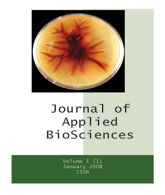Journal of Applied Biosciences (J. Appl. Biosci.) [ISSN 1997 - 5902]
Volume 51: 3633 - 3641. Published March 29, 2012.
Effect of Pleurotus tuber-regium Singer on degradation of rattan wood and maize stovers
Adenipekun, C.O., Okunlade, O.A. and Ogunjobi, A.A.
Department of Botany and Microbiology, University of Ibadan, Nigeria.
RESUME
Objective: To investigate the potential of Pleurotus tuber-regium in the degradation of rattan wood and maize stovers.
Methodology and results: Twenty five (25g) each of the substrates rattan wood and maize stovers were weighed after the addition of 75ml of distilled water. They were covered with aluminum foil and sterilized at 1210C for 15minutes. Later they were inoculated with two 5mm agar diameter mycelia and incubated at 28 ±2 0 C. The controls were not incubated. This was replicated four times and harvested after 30, 60 and 90days.The proximate composition; percentages of nitrogen, carbon and potassium, pH, loss of organic matter, digestibility and metabolisable energy and in-vitro gas digestibility were carried out on the substrates degraded by P.tuber-regium. In degraded rattan wood, crude protein increased significantly from 1.60% to 5.90% and on maize stovers 2.75% to 8.74%, crude fibre decreased significantly from 44.68% to 20.92% for rattan wood and maize stovers 32.33% to 13.03% after 90 days of incubation .In both substrates ether extract, ash and dry matter contents also decreased but moisture contents increased from 0-90days.Carbon, Nitrogen and Potassium increased significantly as the incubation period increased. The pH decreased with the least value being 4.55. Loss of organic matter of the substrates reduced significantly as the period of incubation increased. There was also significant decrease in loss of water as the incubation period increased, the lowest being 32.25 % in rattan wood. There was a reduction in fibre analysis and enzyme production but the organic matter digestibility and metabolisable energy increased with the incubation period .Gas production for in-vitro gas digestibility increased at three hour intervals with highest volume being 29.00ml at 24hours for maize stovers.
Conclusion and applications of findings: The results showed that environmental wastes can be recycled and controlled by biodegradation and the product would be of nutritive value in compounding ruminant feeds.
Key words: Biodegradation, Rattan wood, Maize Stovers, Pleurotus tuber-regium.
FULL PAPER [PDF AVAILABLE HERE]
